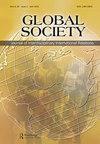A Cosmopolitan Reading of Modern Monetary Theory
IF 2.3
Q2 INTERNATIONAL RELATIONS
引用次数: 1
Abstract
ABSTRACT The increasingly influential neochartalist Modern Monetary Theory (MMT) comes with a nation-state-centric framing of politics. The neochartalists argue that many alleged globalisation-related constraints on national economic policy are illusory or seriously overstated. In their view, monetarily sovereign states enjoy substantial autonomy over their fiscal and monetary policy decisions. The neochartalist diagnosis thus seems to undermine cosmopolitan calls for supranational forms of macroeconomic governance. However, this paper argues that if we pay serious attention to a range of subtler obstacles and strategic incentives that apply especially to small currency-issuing states, cosmopolitan aspirations remain well-motivated. Accordingly, the political implications of MMT are reexamined and a case for supranational exercise of monetary sovereignty is made. The paper goes on to demonstrate how the standard state-centric approach to currency privileges can prove counterproductive from the perspective of democratic governance. It is concluded that neochartalism and cosmopolitanism can fruitfully both correct and enrich each other.现代货币理论的世界性解读
摘要影响越来越大的新哈特主义现代货币理论是以国家为中心的政治框架。新宪章主义者认为,许多所谓的与全球化有关的对国家经济政策的限制是虚幻的,或者被严重夸大了。在他们看来,货币主权国家在财政和货币政策决策方面享有很大的自主权。因此,新宪章主义的诊断似乎破坏了世界对超国家形式宏观经济治理的呼吁。然而,本文认为,如果我们认真关注一系列微妙的障碍和战略激励措施,特别是适用于小货币发行国,那么国际化的愿望仍然是积极的。因此,重新审视了MMT的政治含义,并提出了超国家行使货币主权的理由。本文继续论证了从民主治理的角度来看,以国家为中心的货币特权标准方法可能会适得其反。结果表明,新宪章主义和世界主义可以卓有成效地相互修正和丰富。
本文章由计算机程序翻译,如有差异,请以英文原文为准。
求助全文
约1分钟内获得全文
求助全文
来源期刊

Global Society
INTERNATIONAL RELATIONS-
CiteScore
3.10
自引率
6.20%
发文量
32
期刊介绍:
Global Society covers the new agenda in global and international relations and encourages innovative approaches to the study of global and international issues from a range of disciplines. It promotes the analysis of transactions at multiple levels, and in particular, the way in which these transactions blur the distinction between the sub-national, national, transnational, international and global levels. An ever integrating global society raises a number of issues for global and international relations which do not fit comfortably within established "Paradigms" Among these are the international and global consequences of nationalism and struggles for identity, migration, racism, religious fundamentalism, terrorism and criminal activities.
 求助内容:
求助内容: 应助结果提醒方式:
应助结果提醒方式:


